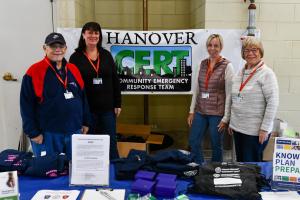Community Emergency Response Team
 The Community Emergency Response Team (CERT) program educates people about disaster preparedness for hazards that may impact their area and trains them in basic disaster response skills, such as fire safety, light search and rescue, team organization, and disaster medical operations.
The Community Emergency Response Team (CERT) program educates people about disaster preparedness for hazards that may impact their area and trains them in basic disaster response skills, such as fire safety, light search and rescue, team organization, and disaster medical operations.
Using the training learned in the classroom and during exercises, CERT members can assist others in their neighborhood or workplace following an event when professional responders are not immediately available to help. CERT members also are encouraged to support emergency response agencies by taking a more active role in emergency preparedness projects in their community.
Course Overview
The purpose of the CERT Basic Training is to provide the individuals who complete this course with the basic skills that they will need to respond to their community’s immediate needs in the aftermath of a disaster when emergency services are not immediately available. By working together, CERT members can assist in saving lives and protecting property using the basic techniques in this course. The target audience for this course is individuals who desire the skills and knowledge required to prepare for and respond to a disaster.
Overall Course Objectives upon completing this course, the participants should be able to:
- Disaster Preparedness
- Fire Safety and Utility Control
- Disaster Medical Operations - Part 1
- Disaster Medical Operations - Part 2
- Light Search and Rescue Operations
- CERT Organization
- Disaster Psychology
- Terrorism and CERT
- CPR
- Course Review and Final Exam
Get involved with CERT. Create a Preparedness Community account today!
The CERT program offers a consistent, nationwide approach to volunteer training and organization that professional responders can rely on during a disaster situation. Search for a program, register your group, and stay connected in your neighborhood!
After CERT Basic Training
Upon completion of the CERT Basic Training course, you will receive a certificate. You will become part of the Community Shelter Team. Your community may also provide you with additional documents that will identify you as an emergency response team member during disaster response. You should maintain your CERT safety equipment, such as goggles, gloves, and basic first aid supplies, and have them available for use during a disaster. Training in disaster response should not be a one-time event. Awareness, commitment, and skills must be reinforced through follow-up training and repeated practice to maintain the edge necessary for effective response in the face of a disaster. To maintain your skill level and continually improve performance, you and your team members should participate in continuing supplemental training when offered in your area. Working through practice disaster scenarios with other teams will provide opportunities not only for extended practice but also for valuable networking with teams in the local area.

